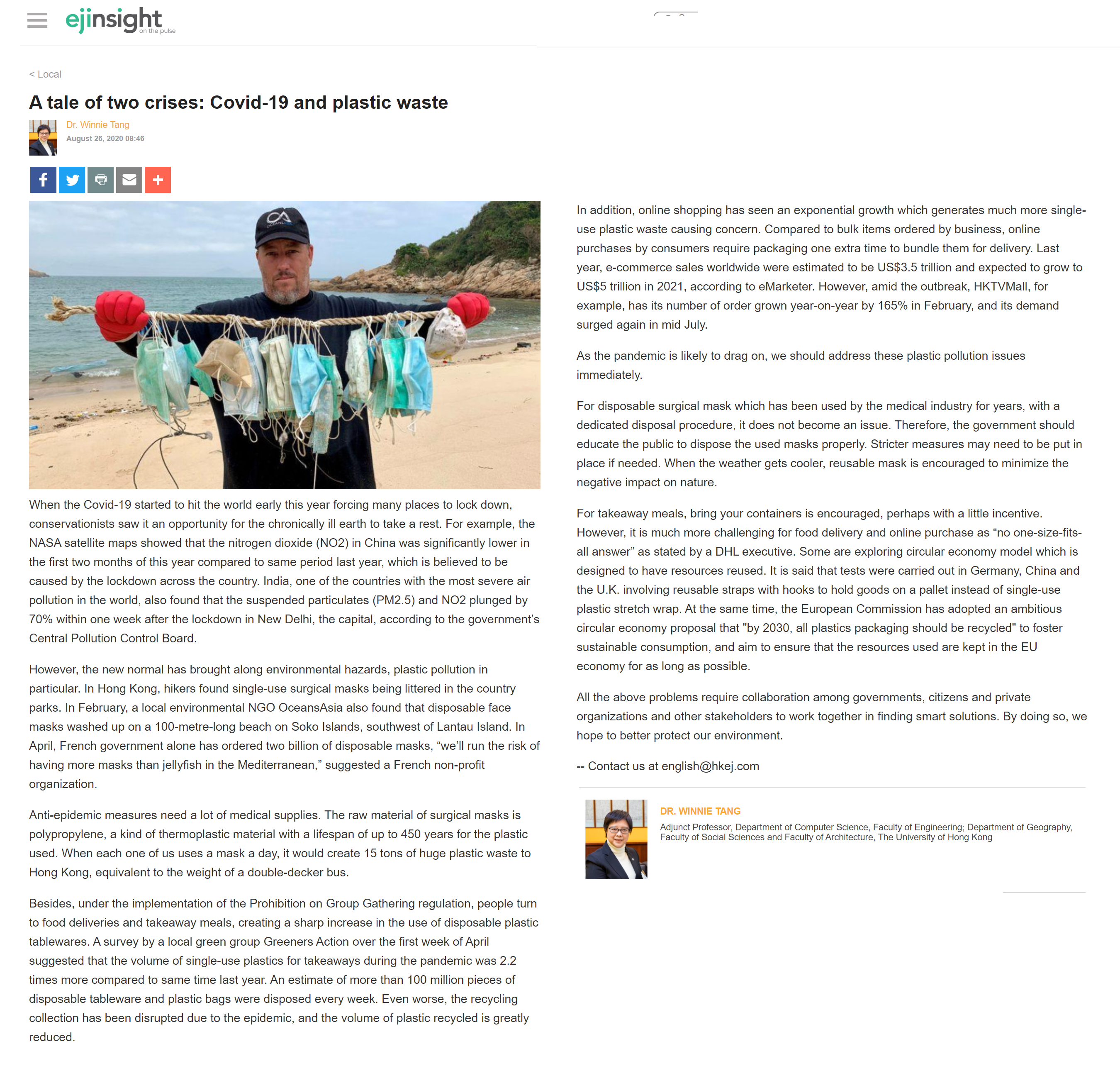網上版請按此

A tale of two crises: Covid-19 and plastic waste
When the Covid-19 started to hit the world early this year forcing many places to lock down, conservationists saw it an opportunity for the chronically ill earth to take a rest. For example, the NASA satellite maps showed that the nitrogen dioxide (NO2) in China was significantly lower in the first two months of this year compared to same period last year, which is believed to be caused by the lockdown across the country. India, one of the countries with the most severe air pollution in the world, also found that the suspended particulates (PM2.5) and NO2 plunged by 70% within one week after the lockdown in New Delhi, the capital, according to the government's Central Pollution Control Board.
However, the new normal has brought along environmental hazards, plastic pollution in particular. In Hong Kong, hikers found single-use surgical masks being littered in the country parks. In February, a local environmental NGO OceansAsia also found that disposable face masks washed up on a 100-metre-long beach on Soko Islands, southwest of Lantau Island. In April, French government alone has ordered two billion of disposable masks, “we’ll run the risk of having more masks than jellyfish in the Mediterranean,” suggested a French non-profit organization.
Anti-epidemic measures need a lot of medical supplies. The raw material of surgical masks is polypropylene, a kind of thermoplastic material with a lifespan of up to 450 years for the plastic used. When each one of us uses a mask a day, it would create 15 tons of huge plastic waste to Hong Kong, equivalent to the weight of a double-decker bus.
Besides, under the implementation of the Prohibition on Group Gathering regulation, people turn to food deliveries and takeaway meals, creating a sharp increase in the use of disposable plastic tablewares. A survey by a local green group Greeners Action over the first week of April suggested that the volume of single-use plastics for takeaways during the pandemic was 2.2 times more compared to same time last year. An estimate of more than 100 million pieces of disposable tableware and plastic bags were disposed every week. Even worse, the recycling collection has been disrupted due to the epidemic, and the volume of plastic recycled is greatly reduced.
In addition, online shopping has seen an exponential growth which generates much more single-use plastic waste causing concern. Compared to bulk items ordered by business, online purchases by consumers require packaging one extra time to bundle them for delivery. Last year, e-commerce sales worldwide were estimated to be US$3.5 trillion and expected to grow to US$5 trillion in 2021, according to eMarketer. However, amid the outbreak, HKTVMall, for example, has its number of order grown year-on-year by 165% in February, and its demand surged again in mid July.
As the pandemic is likely to drag on, we should address these plastic pollution issues immediately.
For disposable surgical mask which has been used by the medical industry for years, with a dedicated disposal procedure, it does not become an issue. Therefore, the government should educate the public to dispose the used masks properly. Stricter measures may need to be put in place if needed. When the weather gets cooler, reusable mask is encouraged to minimize the negative impact on nature.
For takeaway meals, bring your containers is encouraged, perhaps with a little incentive. However, it is much more challenging for food delivery and online purchase as “no one-size-fits-all answer” as stated by a DHL executive. Some are exploring circular economy model which is designed to have resources reused. It is said that tests were carried out in Germany, China and the U.K. involving reusable straps with hooks to hold goods on a pallet instead of single-use plastic stretch wrap. At the same time, the European Commission has adopted an ambitious circular economy proposal that "by 2030, all plastics packaging should be recycled" to foster sustainable consumption, and aim to ensure that the resources used are kept in the EU economy for as long as possible.
All the above problems require collaboration among governments, citizens and private organizations and other stakeholders to work together in finding smart solutions. By doing so, we hope to better protect our environment.
Dr. Winnie Tang
Adjunct Professor, Department of Computer Science, Faculty of Engineering; Department of Geography, Faculty of Social Sciences and Faculty of Architecture, The University of Hong Kong